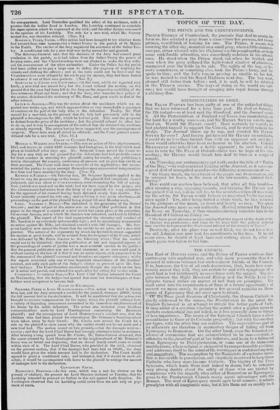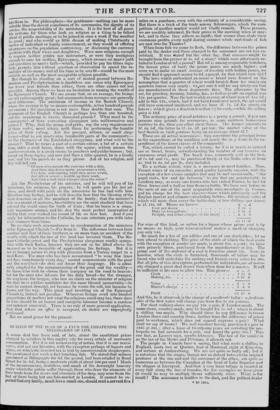THE CHURCH.
THE Earl of MOUNTCASHEL and the Bishop of FERNS continue their controversy with unabated zeal, and with more personality than it is pleasant to witness between two such eminent friends of the Church. It is, however, the fate of all such discussions, that, begin how cour- teously soever they will, they are certain to end with symptoms of a spirit that is but indifferently in accordance with the suhjeet. The dis- pute between the Right Reverend Bishop and the Noble Lord has hitherto turned rather on matter of fact than on principles. We shall enter into the consideration of them at a future opportunity; at present we mean merely to premise a few general remarks on Those points of Episcopacy that are most open to attack. –fIrfrinhree great divisions of Christianity, the Roman Catholie is chiefly addressed to the senses, the Presbyterian to the mind, the English Episcopal is an attempt to mingle the better parts of both. It may admit of a question whether the search after a golden mean in matters ecclesiastical has not failed, as it has generally done in things of less importance. The forms of the Episeopal Church have a close resemblance to those of its Catholic progenitor ; but with the one they are types, with the other they are realities. The 8upers!iIioiiv part of its adherents are therefore in momentary danger of falling off from Episcopacy to Romanism. On the other hand, even the tolerated ex- istence of ceremonies that are acknowledged to be non-essential, is offensive to the .fanatical part of her followers, and leads to a failing off from Episcopacy to Presbyterianism, or some one of its numerous modifications, where religion is stripped of its comprehensible clothing, and addresses itself to the mind of the worshipper in undefined mystery andemagnitude..,/ The assumption by the of exclusive salvo.- tion is favouribte to proselytism, and singularly contrived to keep those Catholic who have once become Catholic. The bigotry of the Pres- byterians, which leads them (not indeed to damn, but) to entertain very strong doubts about the safety of those who are tainted by compliance with the ungodly rites either of Romanism or Episcopacy, gives to the Presbyterian Church nearly equal advantages with the Roman. The door of Episcopacy stands open to all corners; it admits proselytes with all imaginable ease, but it lets them out as readily as it lets them in. For philosophers-for gentlemen:-nothing can be more suitable than the decent comeliness of its ceremonies, the dignity of its service, the respectability of its ministers. It is the hest of all possi- ble systems for those who look on religion as a thing to be talked about at public meetings, or to be joined in once a week if the weather be good ; and who would as little dream of making Christianity. a n Matter of individual or family concernment, as they would of offeng up prayers on the population controversy, or discussing the currency destion with their wives and daughters. Were men religious enough to require neither guides nor instructors, or were they irreligious enough to care for neither, Episcopacy, which crosses no man's. path and questions no man's faith-which, provided he pay his tithes regu- larly, permits him without question or observation to spend the re- Mainder of his money and all his time as he sees fit-would be the most suitable as well as the most acceptable religion possible. But though its standing on a sort of neutral ground between Ro- manism mid Presbyterianism is doubtless one cause why Episcopacy has fewer real friends than either, there are other causes not less powerful. Among these we have no hesitation in naming the wealth of the Episcopal Church. We are aware I hat, on an average, the livings are not extravagantly great; but arguments from averages are generally most fallacious. The minimum of income in the Scotch Church, where the average is by no means contemptible, is two hundred pounds err annum ; the maximum is not more than double that sum. The minimum of the English Church is perhaps less than one hundred, and the maximum is twenty thousand pounds! What must be the causcquen<'e of thus converting clergymen into millionnaires and princes ? Why, that the pomp and pride, nay the very requirements of their ordcr, must utterly unfit them for performing the humble duties of their caiiingr. Ask the peasant, artisan, or small shop- keeper-that is, ask nmetv-nine hundredth parts of the community- for the character of the Established clergyman, and what will be the answer ? That he wears a coat of a certain colour, a hat of a certain form, rides a good horse, dines with the squire, seldom misses the quarter-sessions, is a great enemy to poachers and public-houses ; but, except on these topics, and now and then a tithe quarrel, he is a kindly man, and lets 'his parish do as they please. Ask of his religion, and they will tell you " Of men who mount the rostrum with a skip, And then Skip down again, pronounce a text, Cry hem, and reading what they never wrote, Jrat fifteen miracles, huddle up their work, And with a well-bred whisper close the scene."
.Ask the Presbyterian of his minister, and he will tell you of his visitations, his sermons, his prayers ; he will quote you his last ad- dress, and dwell with pride on the interviews he has had with him. Question him farther, and he will describe how that the blessing of the head descends on all the members of the family; that the minister's wife is a model of matrons, his children are the most obedient that have entered the world since the birth of Cain ; that his horse is a singu- lady sagacious animal, and his dog the most perfect incarnation of fidelity that ever walked the round of life on four feet. And if you apply for information to the Catholic, he can entertain you with tales even stranger than these.
Do we state such circumstances in condemnation of the ministers of the Episcopal Church ?-Far from it. The difference between their conduct and that of their brethren is no more than an accident of the Weall h with which the law of the land has invested them. The Ro- man Catholic priest and the Presbyterian clergyman readily sympa- thize with their flocks, because they are not so far lifted above the meanest as to be incapable of appreciating his feelings. But it is not in human nature to step with pleasure from a Turkey carpet to a thud floor. The man who has been accustomed "to wear fine linen and fare sumptuously every day," cannot communicate with the poor
and the wretched-he does not know their language. He is admi- rably adapted for the companionship of the great and the wealthy- for those who wish to choose their company on the road to heaven: but for the man who labours for his daily bread-for the stranger, the wayfarer, the beggar, who has no claim on the minister of religion but that he is a fellow candidate for the same blessed immortality-to such he cannot descend, not because he wants the will, but because he knows not the way. This great and besetting sin of the Episcopal Church is, indeed, not peculiar. Wherever livings swell into bloated proportions (it matters not what the religious creed may be), there does he who should be an honest and energetic labourer become a careless and indolent sinecurist. There is no rule of more general application, than that where an office is overpaid, its duties are impeilectly Porformed.
But we must pause for the present.



















 Previous page
Previous page